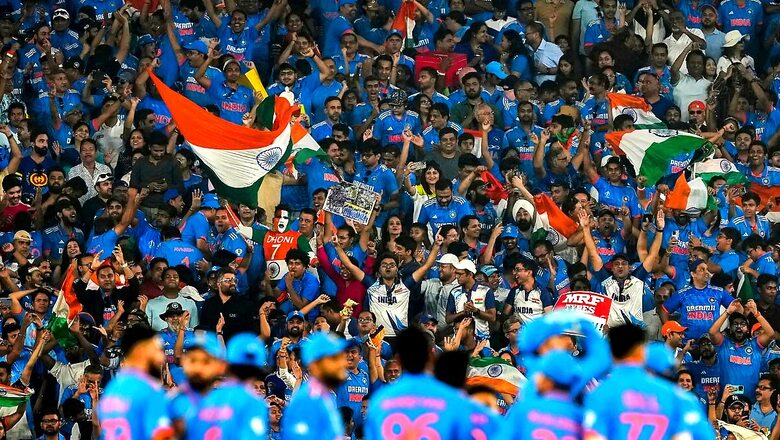
views
The International Cricket Council (ICC) has estimated that the ICC Men’s Cricket World Cup 2023 generated “an incredible total economic impact” of $1.39 billion (Rs 11,637 crore) for the economy of India. It also created 48,000 full and part-time jobs. This news did not receive as much attention or evoke reaction as it should have. The reason is simple: our public discourse is still not ready to accept the fact that fun, entertainment, and sports can be decent economic activities.
Since Gandhian and Marxian doctrines majorly influence our public discourse, it is widely believed that there are two kinds of collective human endeavors which are almost mutually exclusive. First, there are the ones intended to uplift the poor, boost development, and support progress; their driver is mostly government and government-sponsored entities like public sector enterprises and banks. This is the good stuff, the serious thing. The second are the efforts intended to make profit; these are usually and obviously carried out by private companies whose sole motive is making profit. Since profit is, as Nehru said, a “dirty” word, what private enterprise does is often bad.
Needless to say, pinkish intellectuals peddle such pseudo-classifications.
Such folklore results in occasional paroxysms of irrationality. In April 2018, for instance, petitions were filed against hosting the Indian Premier League in Maharashtra because there was a drought in the state. The opponents of IPL raised objections over the “wastage” of water to maintain cricket grounds across the state. As if IPL triggered water shortage!
Now folklore is often based on fables; this was surely true about those who were ranting against IPL. Anything about, or even against, IPL catches attention; this offers a good opportunity to publicity seekers. Facts, however, were very different. A paper that was co-authored by the prominent economist Ashok Gulati around the same time said that “sugarcane occupying 4 per cent of gross cropped area in Maharashtra takes away almost two-thirds of irrigation water of the state. And this happens when overall irrigation cover in Maharashtra is just 19 per cent compared to about 48 per cent at all India level.”
The real culprit was sugarcane cultivation, but saying such a thing or indulging in any activism to check that can have unpleasant consequences for the beneficiaries of the entrenched ecosystem can strike back. So, what do phone do-gooders do? Usher in a bugbear and fight it: there is no danger in fighting imaginary goblins.
Political and intellectual elites, along with sundry activists, have been creating goblins at least since Independence. Whenever anything pleasurable, or even forward-looking, is conceived or planned in our country, they raise a stink.
When colour television was introduced and Asian Games were organised in 1982, they screamed, ‘Can a poor country where potable water is not available to millions of people afford such luxuries?’ When former prime minister Rajiv Gandhi talked about making India ready for the twenty-first century, they again ranted about the poor not getting potable water. When Formula One was held in 2011, they again made the same noises.
It is not just the professional revolutionaries and ‘nattering nabobs of negativism’ who have been spoilsports; even the heavyweights of establishment have opposed mega sports events quite seriously. In 2007, senior Congress leader and the then sports minister Mani Shankar Aiyar had a duel with the sports czar Suresh Kalmadi over the issue of hosting Asian Games in Delhi in 2014.
Kalmadi argued forcefully that as Delhi was already hosting the 2010 Commonwealth Games, three more stadia would enable it to host the Asian Games. The 2014 Games, he said, would bring in investments worth “thousands of crores.” The Union Cabinet supported his case—except, ironically, the sports minister.
The irony becomes understandable if one scrutinises the personality of Aiyar, an incorrigible Nehruvian who continues to believe in the absurdities of socialism and cognate pathologies. Such grandees have shut not just their eyes and ears but also their minds to the realities that don’t fit into the labyrinth called socialism.
Unfortunately, Aiyar is not alone; there are a large number of people (like the anti-IPL petitioners in 2018) who believe that sports events—indeed anything that is big and glitzy—is an abomination that shouldn’t take place because ‘a poor country where potable water is not available…’
What these people don’t see, or want to see, is the fact that there is no contradiction between glitzy events and welfare measures; it is not at the expense of the poor that such celebrations take place; and Maharashtra farmers’ water is not stolen to prepare IPL grounds.
Class war is an ideological construct that has nothing to do with the real world. When big sports tournaments take place, everyone benefits—from sportspersons to the professionals related to the game to the hospitality sector to the transport business. It is a win-win situation.
As facts like the good impact of Cricket World Cup 2023 on the Indian economy become better known, one can hope to suffer less professional activists’ drivel.
The author is a freelance journalist. Views expressed in the above piece are personal and solely those of the author. They do not necessarily reflect News18’s views.




















Comments
0 comment